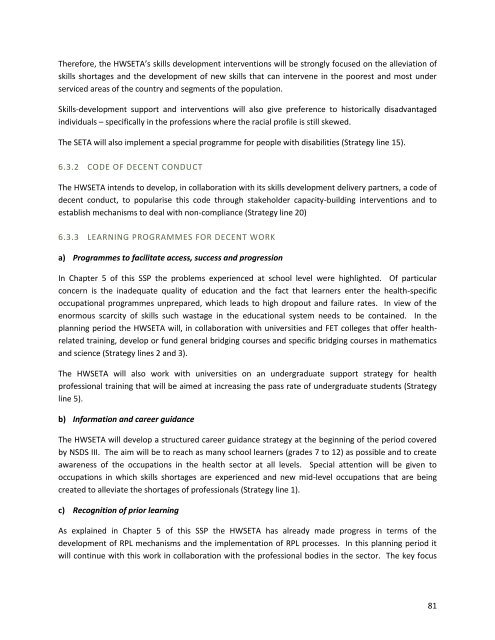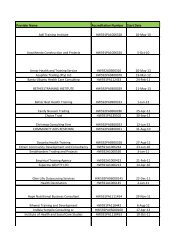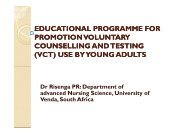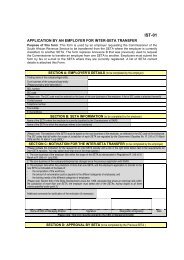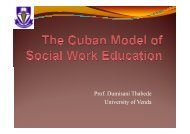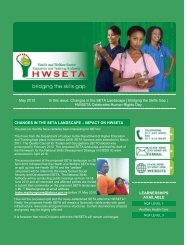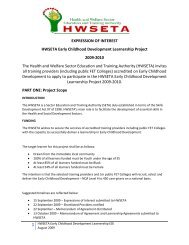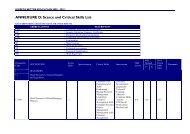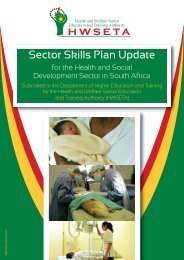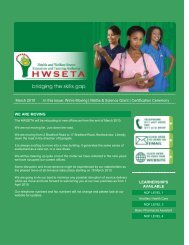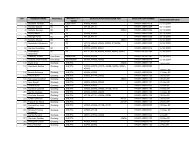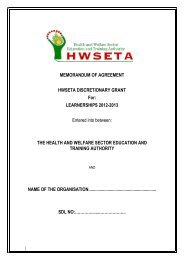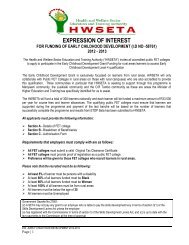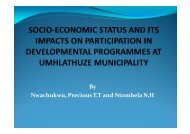sector skills plan for the health sector in south africa
sector skills plan for the health sector in south africa
sector skills plan for the health sector in south africa
Create successful ePaper yourself
Turn your PDF publications into a flip-book with our unique Google optimized e-Paper software.
There<strong>for</strong>e, <strong>the</strong> HWSETA’s <strong>skills</strong> development <strong>in</strong>terventions will be strongly focused on <strong>the</strong> alleviation of<br />
<strong>skills</strong> shortages and <strong>the</strong> development of new <strong>skills</strong> that can <strong>in</strong>tervene <strong>in</strong> <strong>the</strong> poorest and most under<br />
serviced areas of <strong>the</strong> country and segments of <strong>the</strong> population.<br />
Skills-development support and <strong>in</strong>terventions will also give preference to historically disadvantaged<br />
<strong>in</strong>dividuals – specifically <strong>in</strong> <strong>the</strong> professions where <strong>the</strong> racial profile is still skewed.<br />
The SETA will also implement a special programme <strong>for</strong> people with disabilities (Strategy l<strong>in</strong>e 15).<br />
6.3.2 CODE OF DECENT CONDUCT<br />
The HWSETA <strong>in</strong>tends to develop, <strong>in</strong> collaboration with its <strong>skills</strong> development delivery partners, a code of<br />
decent conduct, to popularise this code through stakeholder capacity-build<strong>in</strong>g <strong>in</strong>terventions and to<br />
establish mechanisms to deal with non-compliance (Strategy l<strong>in</strong>e 20)<br />
6.3.3 LEARNING PROGRAMMES FOR DECENT WORK<br />
a) Programmes to facilitate access, success and progression<br />
In Chapter 5 of this SSP <strong>the</strong> problems experienced at school level were highlighted. Of particular<br />
concern is <strong>the</strong> <strong>in</strong>adequate quality of education and <strong>the</strong> fact that learners enter <strong>the</strong> <strong>health</strong>-specific<br />
occupational programmes unprepared, which leads to high dropout and failure rates. In view of <strong>the</strong><br />
enormous scarcity of <strong>skills</strong> such wastage <strong>in</strong> <strong>the</strong> educational system needs to be conta<strong>in</strong>ed. In <strong>the</strong><br />
<strong>plan</strong>n<strong>in</strong>g period <strong>the</strong> HWSETA will, <strong>in</strong> collaboration with universities and FET colleges that offer <strong>health</strong>related<br />
tra<strong>in</strong><strong>in</strong>g, develop or fund general bridg<strong>in</strong>g courses and specific bridg<strong>in</strong>g courses <strong>in</strong> ma<strong>the</strong>matics<br />
and science (Strategy l<strong>in</strong>es 2 and 3).<br />
The HWSETA will also work with universities on an undergraduate support strategy <strong>for</strong> <strong>health</strong><br />
professional tra<strong>in</strong><strong>in</strong>g that will be aimed at <strong>in</strong>creas<strong>in</strong>g <strong>the</strong> pass rate of undergraduate students (Strategy<br />
l<strong>in</strong>e 5).<br />
b) In<strong>for</strong>mation and career guidance<br />
The HWSETA will develop a structured career guidance strategy at <strong>the</strong> beg<strong>in</strong>n<strong>in</strong>g of <strong>the</strong> period covered<br />
by NSDS III. The aim will be to reach as many school learners (grades 7 to 12) as possible and to create<br />
awareness of <strong>the</strong> occupations <strong>in</strong> <strong>the</strong> <strong>health</strong> <strong>sector</strong> at all levels. Special attention will be given to<br />
occupations <strong>in</strong> which <strong>skills</strong> shortages are experienced and new mid-level occupations that are be<strong>in</strong>g<br />
created to alleviate <strong>the</strong> shortages of professionals (Strategy l<strong>in</strong>e 1).<br />
c) Recognition of prior learn<strong>in</strong>g<br />
As expla<strong>in</strong>ed <strong>in</strong> Chapter 5 of this SSP <strong>the</strong> HWSETA has already made progress <strong>in</strong> terms of <strong>the</strong><br />
development of RPL mechanisms and <strong>the</strong> implementation of RPL processes. In this <strong>plan</strong>n<strong>in</strong>g period it<br />
will cont<strong>in</strong>ue with this work <strong>in</strong> collaboration with <strong>the</strong> professional bodies <strong>in</strong> <strong>the</strong> <strong>sector</strong>. The key focus<br />
81


